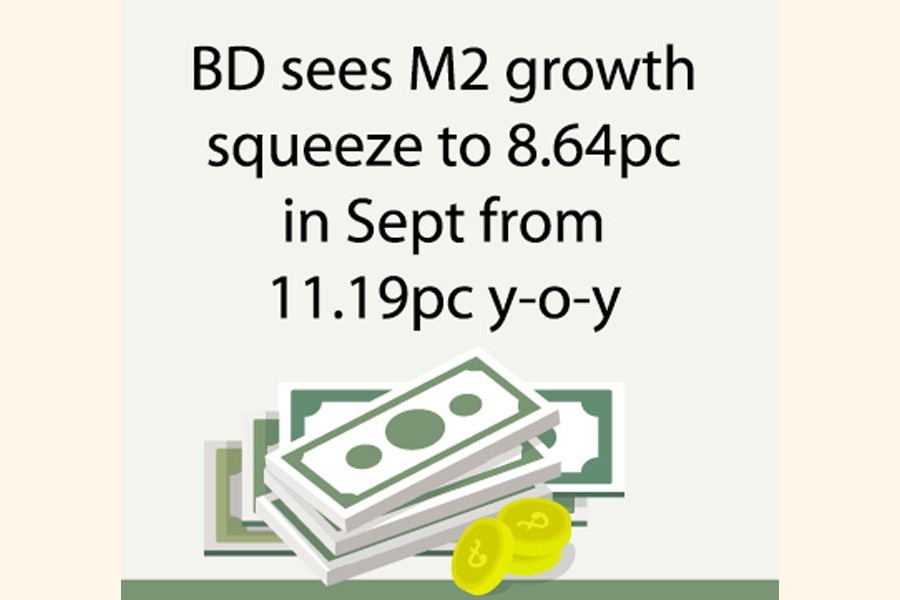Growth in broad money that includes physical currency, some sorts of deposits in banks and very liquid securities gets stymied significantly as Bangladesh tightens belt to navigate a feared oncoming worldwide recession.
Official data show the M2 growth fell to 8.64 per cent, year on year, at the end of September 2022 from 11.19 per cent this time a year before -- meaning contraction in money supply into the economy to contain inflationary pressure.
The M2 stood at Tk 17.228 trillion at the end of September 2022, according to the Bangladesh Bank statistics (BB), released Thursday.
Central bankers say this is due to a fall in the net foreign asset (NFA) of the banking system as the central bank had sold out dollars to stabilise the forex market. The NFA declined by 11.2 per cent during the period under review, according to the BB data.
On the other hand, another component of the broad money, that is, net domestic asset or NDA surged during the period.
Private-sector credit growth involving the NDA had surged nearly 14 per cent during the period. Private- credit growth was 8.77 per cent during the same period a year earlier.
The central bank continues to engage in a wide variety of unprecedented efforts to stabilise the forex market, including tightening imports.
Money-supply growth can often be helpful to measuring economic activity. During periods of economic boom, the money supply tends to grow quickly as commercial banks make more loans. Recessions, on the other hand, tend to be preceded by periods of slowing rates of money-supply growth.
However, some factors are working to grow money creation in the domestic end or NDA which expanded by 14.84 per cent at the end of September last on grounds of rise in both-public and private- sectors credits.
Economists view that the NDA is quite okay and the investors are getting loans. But they feel the need for stabilisation in the foreign-exchange market otherwise it could lead to further downturn in the NFA.
Dr Ahsan H. Mansur, executive director at the Policy Research Institute of Bangladesh (PRI), told the FE that IMF's initial loan amounting to US$ 1.5 billion has nothing to do for NFA.
"If we get $1.5 billion initially, it will again create the same amount of liability on the other end," he says, adding: when the amount will start to be spent, the NFA will again start to decrease.
Dr Zahid Hussain, the former lead economist at the World Bank Dhaka office, told the FE that the central bank should now conduct an assessment as to whether the measures it undertook over the past few months are adequate or not to stabilise the forex market.
"I see still instability on the forex market."
Dr Hussain, however, suggests that the dollar buy-sell caps fixed by BAFEDA (Bangladesh Foreign Exchange Dealers' Association) should be lifted for smooth external trade.
He notes that the government has so far sold out $5.2 billion to stabilize the forex market over the past four months that led to the fall in the "reserve money". And when the reserve money falls, there is felt scarcity of liquidity on the money market.
"To my mind, the caps on lending and deposit also should be withdrawn to boost up the liquidity."


